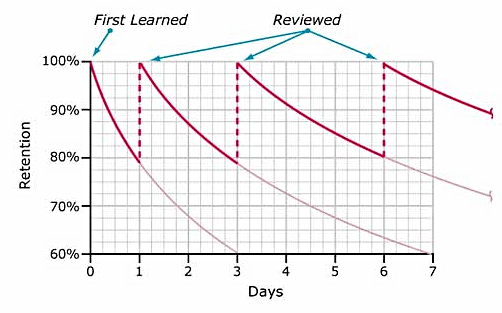How to retain what you read
As a kid I hated books, my retention was poor and reading seemed futile. Turns out, I was right, my retention does suck. But so does yours, and your mom’s, and everyone else’s. Our brains didn’t evolve to remember passages of Shakespeare after one sitting. However, there are techniques that mitigate memory loss. Here’s one that’s simple and effective when applied to non-fiction writing.
But first, a quick lesson in memory. When it comes to retaining the written word, our brains are ill-equipped with a steep forgetting curve, which is why review is so important. But review shouldn’t be tedious or repetitive, quite the opposite. Spaced review at decreasing intervals is far more effective, as depicted in the graph below. By reviewing one hour later, then a day later, then three days, one week, and a month later, those ideas you wish to remember will slowly but surely lock into place. Thirty minutes of review, stretched over a month, is far more effective than five hours of cramming. Which may help you pass a test, but will slip from your short term memory; education is a bad investment if nothing sticks.
Forgetting Curve.jpg
However, If you’re anything like me, you have better things to be doing than fumbling with post-it notes and highlighters. Instead, do what I do and keep a personal index in the back of your book. Anytime you read something important, pertinent, or interesting, star the passage and write the page number in the back of the book with an attached summary. When you’re done, it will look something like this...
When I finish a book, I immediately go back through and re-read all the points that made an impression on me. If it’s something I need to remember, I’ll go back the next day, then the next week, then a month, by which point those ideas have lodged themselves firmly in mind, like a fixed limb. Of course, one could use a mixture of post-it notes and highlighters, which gives off a nice academic and charming aesthetic when placed on a bookshelf. But when it comes to practicality and effectiveness, the index is great. What’s more, If you're really cool, you’d transcribe the index into Evernote, and create a master index of every book you’ve ever read with all its biggest take aways. Enjoy your review, and happy indexing!




